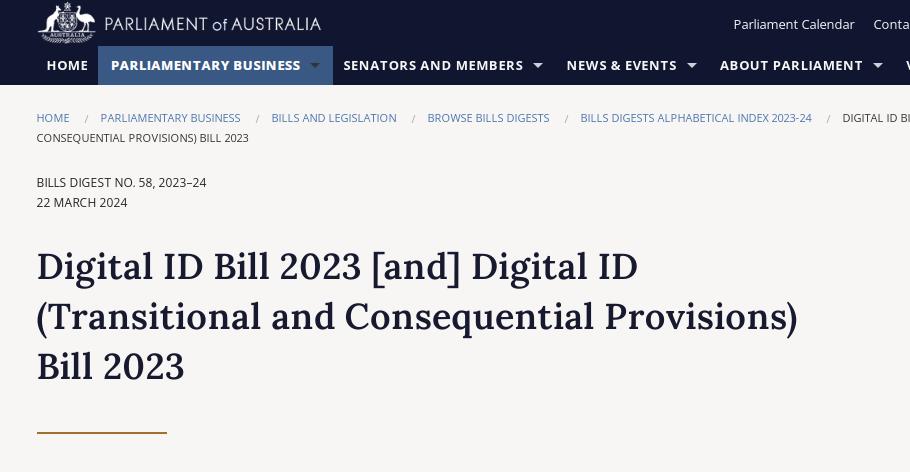
The Digital Identity Bill 2024 has passed through the House of Representatives.
The bill will now be presented to the Governor-General for Royal Assent — where it will officially become law in Australia.
🚨𝗕𝗥𝗘𝗔𝗞𝗜𝗡𝗚: The Digital Identity Bill 2024 has passed through the House of Representatives.
The bill will now be presented to the Governor-General for Royal Assent — where it will officially become law in Australia. pic.twitter.com/JlI5ufcTxi
— Australians vs. The Agenda (@ausvstheagenda) May 16, 2024
🚨 The Australian Government is considering enforcing age verification to use social media just as the Digital ID Bill passes into law.pic.twitter.com/y2ZZnEmOuB
— MilkBarTV (@TheMilkBarTV) May 16, 2024
x.com/AllBiteNoBark88/status/1791288680671510756
The bill aims to establish a network of organizations providing or using digital ID services for government and commercial purposes. Governance will involve multiple agencies, including ASIO, raising concerns among stakeholders about complexity and coordination. Participation in the digital ID system will be voluntary for individuals, with fees for entities prescribed later. Protections for citizen data and consequences for non-compliance are outlined, though ambiguities remain regarding cybersecurity and compliance with other identity verification regimes.
Key points
- The Digital ID Bill 2023 and the Digital ID (Transitional and Consequential Provisions) Bill 2023 (the DID Bills) will establish in legislation a network of organisations that provide or use Digital ID services in delivering participating government and commercial services.
- The DID Bills will establish the architecture and framework for the network. These aspects are based on the Coalition Government’s Trusted Digital Identity Framework (TDIF), which is the basis for current unlegislated arrangements under which myGovID enables access to government services.
- Under the DID Bills governance arrangements will be shared among the Minister and four agencies, with additional agencies providing advice, including the Australian Security Intelligence Organisation (ASIO). Some stakeholders consider the proposed governance arrangements too complex, with too many entities in too many portfolios, leading to concerns about delineation and coordination of roles, and the risk that these shortcomings could be exacerbated when Machinery of Government (MoG) changes occur.
- Individuals’ participation in the Digital ID system will be at no financial cost and voluntary. However, fees for participating entities will be prescribed at a later date in rules and there are stakeholder concerns about protections for individuals who choose not to participate.
- The DID Bills will establish protections for citizens and their data, and consequences for entities’ non-compliance with those protections and the governance requirements. However, there are ambiguities and concerns about, for example, the definition of and responses to cyber security and digital ID fraud incidents.
- There are ambiguities and concerns around the interaction of DID Bill provisions with other legislated regimes for identity verification and digital transactions, such as Know Your Customer (KYC), anti-money laundering and counter-terrorism financing (AML-CTF), and security of critical infrastructure (SOCI).
- The Bill provides for phasing-in, the progressive opening of the system to additional entities beyond initial Commonwealth entities. There is considerable stakeholder criticism that the scope and timing of the phases will be at the Minister’s discretion, and particularly that the Minister has indicated that private sector entities will not fully participate until phase four.
www.aph.gov.au/Parliamentary_Business/Bills_Legislation/bd/bd2324a/24bd058
h/t Little Lost
Views: 335